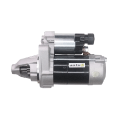Verified Reviews - Mobile Mechanic Near Me
Alyce Pickett
Verified
Very happy with this service. Able to book an appointment for the next day. Jose was friendly, knowledgeable and went the “extra mile” to get us on the road the same day. Price was way better than I expected. Would definitely use Instant Car Fix Again.Thanks Jose !
Donn Jon
Verified
Requested a last minute hub assembly repair same day, came out quick and got the work done fast. Thank you guys for the amazing service! I was a little sketched from the initial reviews but I ran into no problems with this company nor mechanics that came out. Will use these guys again for future car repairs
Junaid Dewda
Verified
For prompt and professional mobile mechanic services, contact Instant Car Fix. Their team is available to assist with any automotive issues, offering fast and reliable solutions right at your doorstep.
Sanity
Verified
This was my first time using this company. The mechanic was on time and replaced my starter and performed an oil change on my Honda. He was quick. Took about 1 1/2 hours. He explained everything to me in detail and even took pictures to show me step by step what he did, all while in the comfort of my own driveway. Great customer service. Will definitely use them again.
Leslie Rubin
Verified
The tech who came out to my home to diagnose the problem with my Dodge Roadtrek RV was amazing. I had this 19 foot behemoth on the lawn where the gas co. needed access, and I could not get it to move. I hesitated to tow it, so found "Instant Car Fix" to come to my home. I wish I could recall the tech's name (it was 03/29/24), because he was such a delight to have working on the van. He diagnosed the problem and made me feel completely comfortable that he knew exactly what the issue was. Definitely putting "Instant Car Fix" in my phone for the future, and YES, I would !00% recommend!!
Alyce Pickett
Verified
Very happy with this service. Able to book an appointment for the next day. Jose was friendly, knowledgeable and went the “extra mile” to get us on the road the same day. Price was way better than I expected. Would definitely use Instant Car Fix Again.Thanks Jose !
Donn Jon
Verified
Requested a last minute hub assembly repair same day, came out quick and got the work done fast. Thank you guys for the amazing service! I was a little sketched from the initial reviews but I ran into no problems with this company nor mechanics that came out. Will use these guys again for future car repairs
Junaid Dewda
Verified
For prompt and professional mobile mechanic services, contact Instant Car Fix. Their team is available to assist with any automotive issues, offering fast and reliable solutions right at your doorstep.
Sanity
Verified
This was my first time using this company. The mechanic was on time and replaced my starter and performed an oil change on my Honda. He was quick. Took about 1 1/2 hours. He explained everything to me in detail and even took pictures to show me step by step what he did, all while in the comfort of my own driveway. Great customer service. Will definitely use them again.
Leslie Rubin
Verified
The tech who came out to my home to diagnose the problem with my Dodge Roadtrek RV was amazing. I had this 19 foot behemoth on the lawn where the gas co. needed access, and I could not get it to move. I hesitated to tow it, so found "Instant Car Fix" to come to my home. I wish I could recall the tech's name (it was 03/29/24), because he was such a delight to have working on the van. He diagnosed the problem and made me feel completely comfortable that he knew exactly what the issue was. Definitely putting "Instant Car Fix" in my phone for the future, and YES, I would !00% recommend!!
Alyce Pickett
Verified
Very happy with this service. Able to book an appointment for the next day. Jose was friendly, knowledgeable and went the “extra mile” to get us on the road the same day. Price was way better than I expected. Would definitely use Instant Car Fix Again.Thanks Jose !































